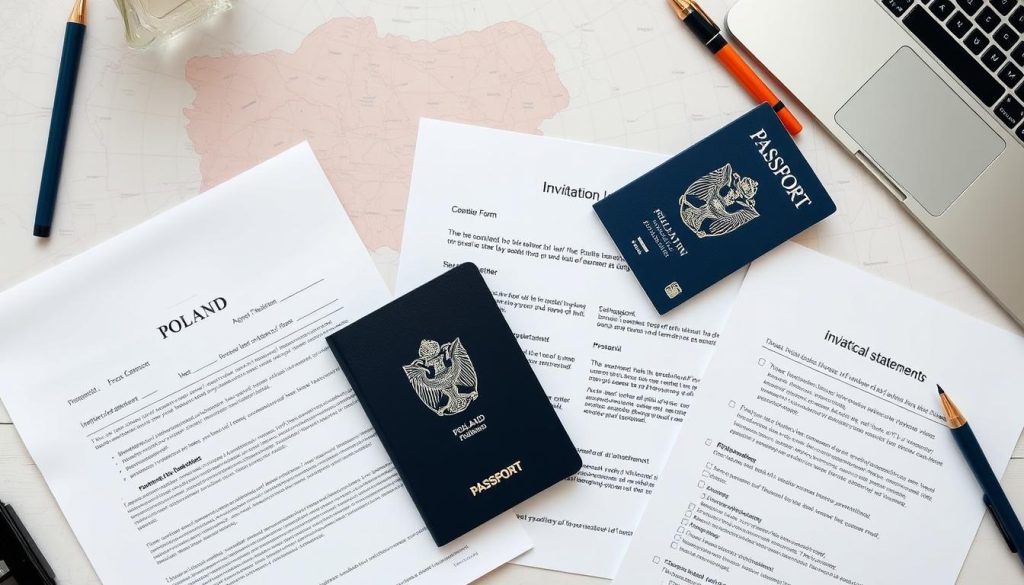Poland has recently ascended to prominence as a dynamic market, drawing entrepreneurs and expatriates seeking a Poland business opportunity. Its burgeoning economy, conducive business environment, and competitive costs render relocating to Poland for business increasingly attractive. This country, strategically positioned at the heart of Europe, offers advanced infrastructure and a highly skilled workforce, cementing its status as a judicious choice for international expansion.
This article delves into the practicalities of Poland business relocation, encompassing legal necessities to the advantages of setting up operations in this burgeoning locale. We invite you to join us as we dissect the elements that make Poland an exemplary destination for your business aspirations.
Understanding the Business Environment in Poland
The Poland business environment is a dynamic arena, beckoning entrepreneurs and investors with its promise. As a European Union member, Poland affords access to a substantial market, with trade regulations streamlined for seamless cross-border transactions. The burgeoning economy, driven by an expanding middle class, presents a fertile ground for innovation and growth. This scenario underscores the potential for businesses to flourish in Poland.

However, the path to success is not without its obstacles. Bureaucratic hurdles and stringent regulatory frameworks can impede the establishment of businesses in Poland. A thorough understanding of the country’s administrative processes is imperative for overcoming these challenges.
Cultural acumen is equally crucial for success. Grasping local customs and practices can significantly enhance interactions with partners and clients. Such knowledge enables businesses to cultivate robust relationships, positioning them advantageously within the competitive environment.
The Benefits of Poland as a Business Destination
Poland’s allure as a business hub is multifaceted, with its economic landscape offering substantial advantages. The operational costs in Poland are notably low, encompassing both affordable labour and reasonable office spaces. This affordability is pivotal for start-ups and entrepreneurs, facilitating the establishment of new ventures without incurring exorbitant expenses.
The country boasts a well-developed infrastructure, which significantly enhances the ease of conducting business. Poland’s transport networks are efficient, its technology hubs are cutting-edge, and its facilities are modern. This infrastructure is complemented by Poland’s strategic location, providing access to both Western and Eastern European markets. Such geographical advantages are invaluable for businesses seeking to expand their reach.
Poland’s workforce is another significant asset. The country’s technical universities are proliferating, ensuring a steady supply of skilled professionals. This talent pool is indispensable for expat businesses, guaranteeing access to the expertise necessary for success. The availability of such a skilled workforce is a cornerstone for the growth and development of businesses operating in Poland.
Considering these factors, Poland emerges as an ideal destination for corporate relocation. The environment is conducive to innovation and growth, positioning Poland as a premier location for business ventures. This combination of economic benefits, infrastructure, and human capital makes Poland an attractive choice for businesses looking to expand or relocate.

Relocating to Poland for business: Key Considerations
Poland’s allure for business relocation is tempered by linguistic hurdles, with English not universally prevalent. Acquiring basic Polish language skills can significantly enhance communication and cultivate positive relationships with local stakeholders.
Integration into the local business milieu is facilitated by active networking. Engaging with Polish entrepreneurs offers invaluable market insights and the opportunity to establish influential connections. Mastery of Polish business etiquette and cultural subtleties is imperative, underscoring the importance of cultural acumen in navigating Poland’s business landscape.
Practicalities are equally critical. The establishment of suitable accommodation and the opening of bank accounts are indispensable steps towards a seamless relocation. A thorough grasp of market dynamics and regulatory frameworks is essential, ensuring a smooth transition into Poland’s dynamic economy.

Legal Requirements for Business Relocation
Embarking on a business relocation to Poland necessitates a thorough understanding of the legal framework governing this endeavour. Acquaintance with these statutes is imperative for a seamless transition, ensuring adherence to local regulations and facilitating market integration.
Initiating the process involves securing the requisite permits and registrations. Poland’s business relocation laws stipulate that foreign entrepreneurs must register their entities with the National Court Register (KRS). This act formally establishes the legal entity of your business within Polish jurisdiction.
The documentation required for registration typically encompasses:
- Proof of identity, such as a passport.
- Documents validating the establishment of a company, including articles of association.
- Proof of address for the business premises.
Regulatory bodies in Poland, including the Polish Economic Chamber and regional development agencies, offer invaluable guidance. They assist in deciphering the complexities of compliance and legal standards, thereby streamlining the registration process.
Expatriates must also be cognizant of laws pertaining to corporate governance, consumer protection, and intellectual property rights. Staying abreast of these regulations is crucial for maintaining legal compliance and avoiding potential legal complications.

Finding the Right Location for Your Business
The selection of an optimal location for business in Poland is paramount for achieving success. Various elements influence this choice, including the economic vitality of cities such as Warsaw, Kraków, and Wrocław. Each urban centre presents distinct business sites in Poland, tailored to diverse industry requirements and demographic segments.
Warsaw, as the capital, boasts an extensive infrastructure and a comprehensive network of transportation options. This facilitates superior connectivity to suppliers and clients, essential for operational success. Conversely, Kraków offers a vibrant cultural environment, drawing a diverse talent pool and potentially boosting customer traffic.
Wrocław, renowned for its burgeoning technology sector, emerges as a prime location for tech-focused enterprises. This city benefits from numerous local business incentives, designed to foster entrepreneurship and innovation.
When evaluating the location for your business in Poland, consider several key aspects:
- Proximity to suppliers and customers
- Quality of transportation networks
- Availability of skilled labour
- Local business incentives
Seeking the assistance of local real estate services can greatly facilitate the identification of appropriate commercial properties. Their expertise in regional markets can unveil hidden opportunities and expedite the rental or acquisition process.

Setting Up a Corporate Structure in Poland
The establishment of a corporate framework in Poland is paramount for the successful inception of a business venture. It necessitates a profound comprehension of the diverse business entities available, each with its unique attributes and legal stipulations. This knowledge is imperative for making decisions that resonate with both the strategic objectives of the enterprise and the legal framework governing it. Below, we delineate the principal options, elucidating their benefits and drawbacks.
Choosing the Right Business Entity
Poland proffers a plethora of business entities, catering to a myriad of requirements. The following are some of the most prevalent:
- Limited Liability Company (LLC): Predominantly chosen by small to medium-sized enterprises, it offers limited liability and a degree of managerial flexibility.
- Joint Stock Company: More apt for extensive operations or entities aspiring to elevate capital through public trading.
- Sole Proprietorship: Optimal for freelancers and solo entrepreneurs, characterized by a streamlined registration process but entails personal liability.
Each entity within Poland’s legal framework carries its distinct set of obligations and implications. Therefore, it is of utmost importance to meticulously assess which structure best aligns with your business’s objectives.
Registering Your Business in Poland
The registration of a business in Poland entails several critical phases. Initially, it is essential to gather the requisite documentation, including:
- Articles of Association.
- Proof of identity and domicile.
- Tax identification number (NIP).
The registration procedure mandates the submission of these documents to the National Court Register (KRS) and generally spans a few weeks. Adherence to all legal prerequisites is paramount to circumvent any potential delays. By grasping the intricacies of Poland’s corporate structure, entrepreneurs can adeptly navigate these processes.

Poland Business Visa: What You Need to Know
For those contemplating a move to Poland in pursuit of employment, grasping the intricacies of the Poland business visa is paramount. The array of visa categories available is designed to meet the diverse needs of entrepreneurs and expatriates seeking to embed themselves within Poland’s burgeoning economy. The application journey, though complex, is a necessary step towards realising one’s professional ambitions in this dynamic setting.
Prospective applicants must acquaint themselves with the requisite documentation to navigate the application process efficiently. Essential documents typically encompass:
- A completed visa application form
- Valid passport with at least six months’ validity
- Proof of financial means
- Business plan or invitation letter from a Polish entity
It is prudent to submit applications with sufficient lead time to account for potential delays in processing. Applicants may encounter hurdles such as the necessity for supplementary documentation or interviews. Proactive preparation can significantly alleviate these obstacles.
To enhance the prospects of a visa approval, consider the following strategies:
- Initiate the application process early to accommodate unforeseen delays.
- Verify that all documents are comprehensive and correctly completed.
- Consult with experts who are adept in navigating Poland’s immigration landscape.

A comprehensive grasp of visa regulations is indispensable for anyone contemplating relocation to Poland for professional reasons. Adopting a strategic approach will facilitate a smooth integration into Poland’s business environment.
Tax Obligations and Benefits in Poland
Grasping the intricacies of tax obligations in Poland is paramount for entities conducting business within its borders. The tax environment in Poland is replete with opportunities and duties that profoundly affect a company’s fiscal well-being.
Corporate Tax Rates
The prevailing corporate tax rate in Poland is 19%. Nonetheless, entities with revenues below €2 million are eligible for a diminished rate of 9%. This disparity empowers nascent enterprises to channel resources towards expansion, rather than solely towards tax liabilities. It is imperative to remain abreast of specific reporting mandates and any alterations to the corporate tax regime in Poland.
Tax Incentives for Expats
Expatriate tax benefits in Poland significantly augment the allure of relocating to the nation. A plethora of incentives are available, including special economic zones that proffer tax exemptions to qualifying entities. These zones serve as catalysts for investment and innovation. Furthermore, research and development tax credits enable businesses to recuperate a portion of their expenditures on innovative endeavours. Acquaintance with these benefits can yield substantial fiscal advantages for expatriates and their enterprises.

Human Resources Considerations
The intricacies of HR in Poland are paramount for businesses aspiring to excel in this vibrant market. Acquaintance with Poland’s labour laws and regulations is imperative for compliance and fostering an optimal work environment. Moreover, tapping into local talent can markedly improve operational efficiency and cultural alignment within the workforce.
Labour Laws and Regulations
Poland’s labour laws delineate specific directives for employers when engaging staff. These include:
- Working hours that typically do not exceed 40 hours per week.
- Minimum wage regulations that ensure fair compensation for employees.
- Rights regarding paid leave and sick leave, which protect employee welfare.
- Mandatory employee contracts that outline the terms and conditions of employment.
Grasping these elements is crucial for establishing a transparent and respectful employer-employee relationship.
Hiring Local Talent
Employing local talent in Poland brings manifold benefits that contribute to a productive work environment. These advantages encompass:
- Familiarity with the local market, enabling better decision-making.
- Language skills that facilitate communication and help bridge cultural gaps.
- An understanding of regional business practices that enhance integration.
By prioritising local talent, businesses can better align with community expectations and cultivate a team that reflects Poland’s cultural values.

Networking and Building Business Relationships
In the dynamic Polish business environment, forging robust connections is paramount for achieving success. The realm of networking in Poland presents a multitude of pathways for professionals to forge and nurture alliances. Participation in industry conferences serves as a prime opportunity to engage with pivotal figures within your field. Conversely, membership in local business associations fosters a deeper sense of community engagement.
The advent of online platforms, notably LinkedIn, has revolutionised networking, allowing users to transcend geographical boundaries. This digital expansion augments traditional networking strategies, thereby amplifying one’s visibility amongst prospective partners.
Networking success hinges on cultural acumen. Below are some actionable strategies to ensure efficacious interactions:
- Engage in thorough research to grasp the nuances of local business etiquette and customs.
- Initiate follow-up actions post initial encounters to solidify connections.
- Participation in social events and gatherings is instrumental in cultivating trust.
- Employ mutual connections to secure introductions to potential contacts.
Testimonials abound, highlighting the efficacy of robust business relationships in Poland in fostering productive partnerships and collaborations. Across sectors, from technology to manufacturing, the strategic utilisation of networks has proven instrumental in unveiling novel opportunities and catalysing expansion.

Cultural Considerations for Doing Business in Poland
Engaging in the Polish business culture necessitates an understanding of the rich historical and traditional contexts that influence contemporary corporate conduct. Familiarity with cultural norms in Poland can significantly enhance business interactions, paving the way for fruitful partnerships.
Face-to-face communication holds paramount importance in Polish business culture. Building relationships often necessitates personal meetings, as trust and rapport are critical components of successful business dealings. Expatriates will find that shaking hands and maintaining eye contact during introductions are standard practices that signal respect and seriousness.
Decision-making processes in Poland differ from those in the UK. Polish businesses often favour a hierarchical structure, where seniority plays a critical role in steering discussions and decisions. This contrasts with more egalitarian models, emphasizing collective input. Understanding this aspect of cultural norms in Poland aids expatriates in navigating corporate meetings effectively.

Patience is vital when establishing connections. Initial meetings may revolve around building a rapport rather than diving into business topics. Acknowledging this approach reflects an appreciation for the cultural nuances present in Polish society and can garner respect from local counterparts.
Lastly, maintaining professionalism and politeness is essential in all business interactions. Punctuality and a formal dress code demonstrate commitment and attention to detail, two attributes highly valued in Polish business culture. By adhering to these principles, expatriates can facilitate smoother entry into the dynamic world of Polish business.
Support Services for Expats in Poland
The relocation to Poland, a country rich in culture and promising business opportunities, can be transformative. For expatriates, navigating a new environment necessitates the right support. A plethora of expatriate resources in Poland can significantly enhance the relocation journey, ensuring a seamless transition into both personal and professional spheres of life.
Expatriate Communities and Resources
Integration into the expatriate community in Poland offers invaluable connections and insights. Engaging with local expatriate groups facilitates the adaptation process through shared experiences. Consider joining:
- Facebook groups focused on expat living in Poland
- Meetup events in major cities
- Local cultural associations that celebrate diversity
These platforms not only facilitate social interactions but also provide critical information on daily living, from housing to local customs. This significantly enhances expat support in Poland.
Professional Services Available
Engaging professional services for expats can simplify the complexities of relocation in Poland. A variety of services tailored for expatriates exists, including:
- Legal services for understanding visa requirements and contracts
- Financial advisory for setting up banking and taxation issues
- Relocation consultancy for a seamless moving process
Collaborating with these professional services ensures comprehensive support for newcomers. This makes their transition into life in Poland as smooth as possible. With the right expatriate resources in Poland, both individuals and businesses can flourish in this vibrant market.

Success Stories of Businesses in Poland
Poland has evolved into a hub of commercial success, attracting both indigenous entrepreneurs and international expatriates. The allure of its dynamic market has propelled numerous enterprises to prominence, particularly in the technology sector. CD Projekt Red, celebrated for its groundbreaking game development, epitomises the potential for innovation and financial gain within this domain. Their journey underscores the importance of grasping local culture and market nuances, leading to remarkable achievements.
The manufacturing sector has also witnessed substantial expansion, with Solaris Bus & Coach leading the charge in sustainable transportation solutions. These entities exemplify the benefits of adaptability in the face of economic shifts and environmental pressures. Despite encountering hurdles such as stringent regulations and market access barriers, they leveraged strategic partnerships and local acumen to overcome these obstacles.
In conclusion, the success narratives from diverse sectors unequivocally demonstrate that, with meticulous preparation and a deep understanding of Polish market dynamics, businesses can thrive. These stories serve as a beacon for those contemplating relocation, showcasing the vast potential for growth and profitability. They illustrate that the journey towards success is not only feasible but also rewarding for those willing to embrace the challenges and opportunities that Poland presents.

